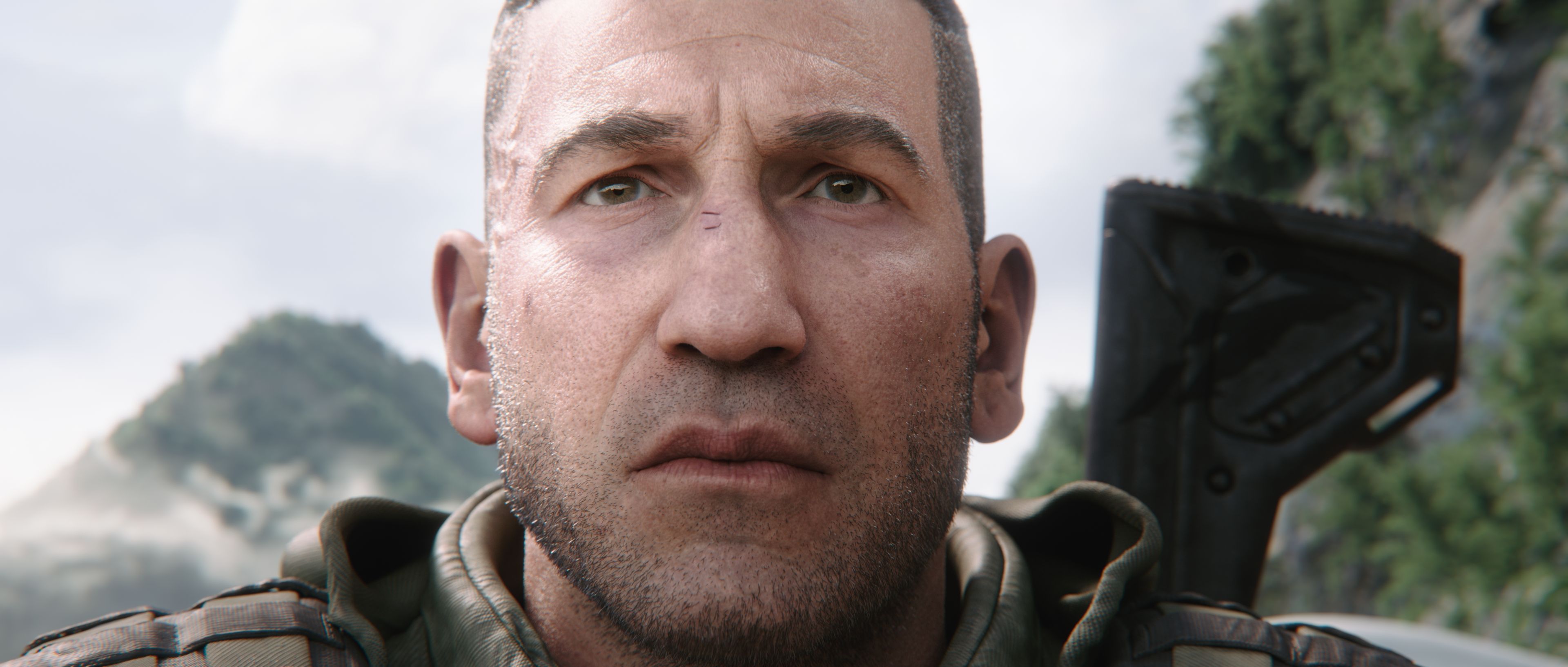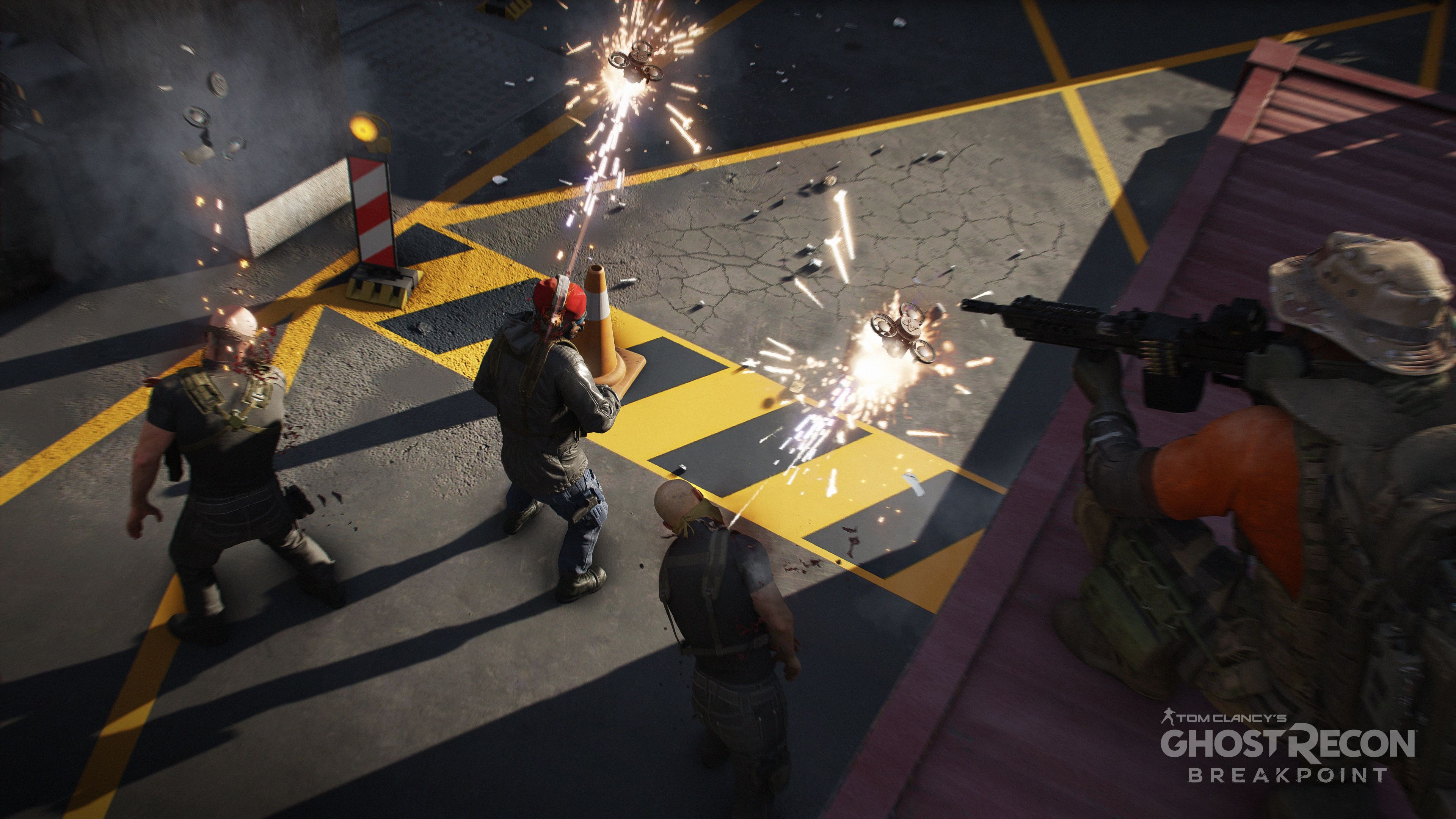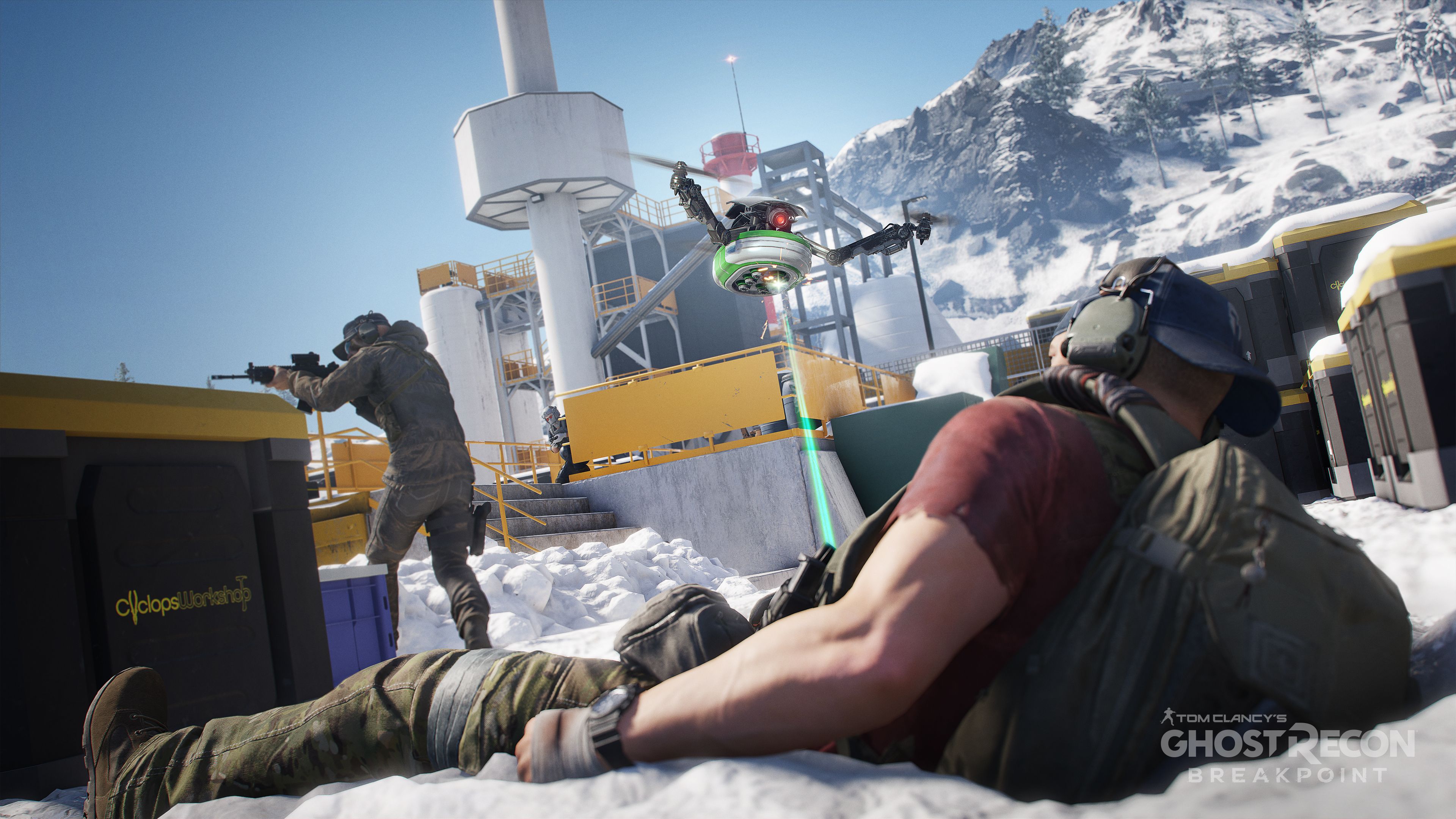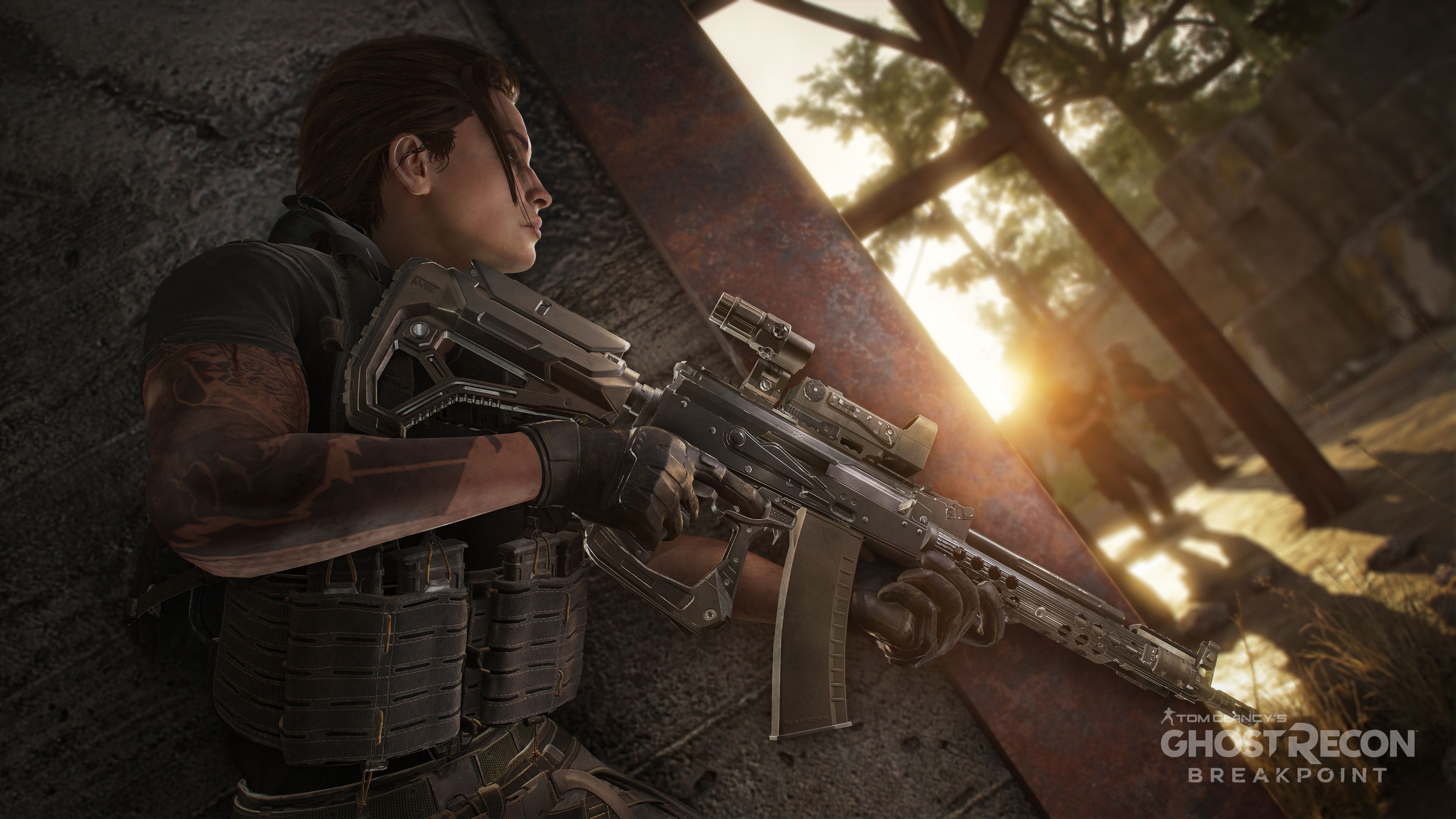Ghost Recon Breakpoint is the latest entry in Ubisoft's tactical shooter franchise. During a preview event last month, DualShockers sat down with the game's writer, Emil Daubon, who also was a Green Beret in the U.S. military. With that in mind, we talked about what his life experiences have brought to the writing in the game, as well as recent controversies surrounding ethical decisions in games depicting real-life combat. Of course, we also talked about working with Jon Bernthal and bringing the character of Cole Walker to life in Ghost Recon Breakpoint.
Jordan Boyd: Given your position and what you've done in your life, what do you think your writing has brought to the story of Ghost Recon Breakpoint, like things that people wouldn't expect based on your background?
Emil Daubon: My role predominantly in writing is on systemic voices, I was brought on to restructure how all the nonplayer characters sound and feel in the world. The systemic narrative designers have a vision, a dream for this game, creating a much more textured world through the systemic voices by layering systems so that there are triggered questions, responses, and interactions. There's a huge database of possible combinations anywhere you go when you interact with characters, there's just more happening. They're saying more, they're doing more, it all ties into the narrative. A lot of that, of course, is with the enemy archetypes. You have two main groups of enemy archetypes, the Sentinel PMCs, your standard contractor sort of security specialists, and the Wolves. We wanted to give each group a very distinct auditory signature in the way that they interact.
Considering my background in the military I was able to bring a lot of specific vernacular to these different archetypes to give them a more real-sounding set of characteristics. We wanted them to be distinctive. As you play you sort of notice the Sentinel PMCs may have varying degrees of experience. You'll feel that in how they talk. Some speak in a very specific military tone and some don't as well as everything in between. Whereas when the Wolves speak they have a sort of efficient vernacular they use, very tactical, very military, and it was all about giving these archetypes specific signatures so you know who you're fighting so they feel real.
That's really where I was able to bring a lot of my experience, not just as a military member but as a human being because I've been living for a while. It was really about giving distinct voices to these archetypes and enough variety so you don't feel like you're running into the same archetype all the time. Every time you're stealthily creeping around a camp and you hear people talking, you're going to hear different conversations and different interactions, you'll feel different tones from these characters. That's really where I was able to bring a lot of my experience because a lot of that work was done on the enemy archetypes. You get a diverse array of voices and hopefully, that shows when you play the game.
[pullquote]"What we wanted to do with Ghost Recon Breakpoint is heighten the fantasy while keeping it playable, moving at a fast pace, engaging, and exciting with a compelling narrative"[/pullquote]
JB: I don't know how much you follow the conversation around shooters in general. But you have a game like Call of Duty: Modern Warfare getting a bit of flack right now for realistic takes, morality, the white phosphorus controversy. When writing a game, do you ever get to a point where you believe it's taking things too far? You've probably experienced hell and back I assume, so when writing a story like this one, what do you tend to consider when thinking about what a player will get to do, what they can control, the morality of choosing to shoot a person, like a civilian, or one of the scientists I saw running around outposts. Does that issue ever present a challenge to you?
ED: Of course it does. The key thing to remember is that what we're doing with this game is creating fantasy. The idea was to take the Ghost Recon fantasy and bring it to the next level. The questions were like how do we allocate the experience of being a Ghost, how do we take the series to the next level, where is that, what does it look like? The game was born of a few specific questions, it started with the two underlying themes the game is built on. What are the dangers of technology and what happens when we lose control of it? Also, what happens when a Ghost faces the greatest challenge a Ghost can face? So you have these significant underlying themes: dangers of technology, brother versus brother. Where do you go from there?
Ultimately what we're doing is creating a fantasy. It's important to remember. Even within the tactical shooter genre, it's a fantasy. You're immersing players in the experience of being a soldier. To live the fantasy of that life. Realism, questions of morality, and ethical dilemmas can actually take you out of that fantasy. What we wanted to do with Ghost Recon Breakpoint is heighten the fantasy while keeping it playable, moving at a fast pace, engaging, and exciting with a compelling narrative. That's what we've done. With any sort of entertainment project, it's about striking a balance between authenticity or realism and a playable fantasy. Oftentimes more real details are less compelling to watch or engage with. Real tactics might not be as cool to see on the screen.
With gameplay mechanics, you often make sacrifices or compromises so that the mechanic works within the constraints of the game, whether it's visually or the coding. The same thing applies to those overarching themes and notions of morality. In Ghost Recon Breakpoint there are consequences for civilian casualties, that is actually very real, there are real consequences to engaging civilian casualties. That's important but that's not the point of it, the point is to keep this a fantasy, to keep it exciting and fun so that the elements of the shooter are there. You have the tactics, the procedures, planning, the shooting, guns, and enemies but it's a playable fantasy steeped in this really compelling narrative and these really deep and profound underlying themes.
JB: Speaking of those themes, how has the story evolved since its initial conception, were there any other things the team wanted to explore that maybe you will down the line in downloadable content or anything of the sort?
ED: I came on board a little bit late so a lot of the overarching narrative had been established when I came on. They'd been writing already for about six months when I started. The core team really began its vision with those questions. Like any Tom Clancy story, it starts with what if something potentially catastrophic happened or is about to happen. The questions that started the creative development of this project, what if the technology becomes so advanced that we lose control of it, that it's easily manipulated for nefarious purposes and what if the greatest challenge a Ghost could face is another Ghost and is forced to. So these two questions were tossed around by the core team early on at the inception of the game. How do we develop this?
From there your characters start to develop because Nomad needed an antagonist that has his training, experience, and background. It was compelling to engage with. That's going to have to be a compelling character and of course, Cole Walker was born from that. Cole Walker took on a life of his own because, in order to be an interesting antagonist for Nomad, that character would have to be huge, larger than life. That was actually easy, that character grew because it was such an interesting question. Those two questions drove the development. The idea of an island, an engineer with the best of intentions is doing research in drone technology and his intent is to change the world for the better. Then someone recognizes that potential danger and takes it on themselves to control it and implement their own changes. The story just evolved from there. Once those basic tenants were established it just blossomed.
JB: Do you think that Jon Bernthal brought things to the role that you didn't expect from him?
ED: That's a great question. I mean, yes of course because he's spectacular. We expected him to do great things for that character obviously. He has such an extensive background in military characters and deeply conflicted characters. That's something that really shows in a lot of his work. He's so good at conveying inner turmoil. That was the expectation for the character early on when Walker became fleshed out, it was obvious who they wanted for that character. I think that decision, that desire, was clear early on.
There was an expectation that Jon would bring a lot of that to the character, but the reality is he brought so much more. Because he brings so much experience in tactics, tactical proficiency, he brings his own visual signature, his own flavor you know? Then working with him he makes great suggestions, he takes direction well, he makes adjustments well. He brought what we expected but exceeded our expectations. He's Jon Bernthal, he's great. This kind of character at its core is what he does so well. So the deeper that we created the conflict within him, the more he brought to the character. As we were shooting the cutscenes with him it was great. The more he played the character and kind of explored his motivations and reasons he was following this path, the deeper he got into it.
JB: I believe this is his first game role. Did he like he was right off the bat pretty comfortable in the different environment than what you'd expect in a more conventional acting setting?
ED: Yes, he's a professional. I think he would appear comfortable in any scenario. It was his first game and he commented on it a number of times just how cool it all was. The motion capture studio is such a unique environment. Looking at it, it's nothing, just an empty room. Cameras, people in the middle of it, no props, minimal setting, these collapsible sets. You can create anything in there. The potential for creation is unlimited, you're limited only by your imagination. He was impressed by that, there were times where he was like 'this is so cool' and of course not having done it before it really hit him sometimes. I've heard him say a couple of times in interviews that now since he has seen the footage and cutscenes he can't believe it's him in a video game. He's definitely excited but he was 100 percent comfortable. He's a professional you know? He's on a professional level that I haven't seen that often. He comes in as a workhorse.
JB: Did the team always want a well-known actor in the role of Cole Walker? Was there anyone else you thought of that you wanted to get ahold of.
ED: I had no input on any of that. I do know that they wanted Jon Bernthal early. The tale goes that basically someone saw him, they watched an episode of The Punisher and were like...[We laugh] I don't know if that's how it happened, I had no part in the casting but I couldn't imagine anyone else in that role. I think from early on nobody else could imagine it either.
JB: Do you think players will be able to relate to Walker or understand where the character's coming from despite the awful things we see him do?
ED: That's interesting, we needed Cole Walker to be so compelling of a character that you can't help but appreciate his perspective. You may not agree with it, you may find his actions or position repugnant, but you can follow the trajectory of his motivations and understand why he's doing what he's doing. Why he believes in what he's doing. Ultimately whether or not people will sympathize with him will come down to how the player will engage with that narrative.
It was important for that character to have the depth that would allow someone engaging with the character to appreciate the perspective. You don't have to agree with it. Again it's about immersing the player in that fantasy. If you don't buy the enemy's motivations you're already taken out of the fantasy. It's important for us to achieve that level of immersion. That's what this is about, it's about creating this fantasy of being a Ghost in the direst circumstances you can imagine, you're fighting the only soldier that could possibly stand a chance against you. You're a Ghost. No other soldier in the world presents a real threat to you in this universe until Cole Walker. That's the point, we want players to feel they're in this fantasy. To achieve this we needed Cole Walker to have a depth that would be understood.
JB: I noticed during my playtime that there was a particular moment where you choose what your character says. Will that change the course of the game, the way the story goes or the gameplay experience?
ED: Ultimately, the optional dialog doesn't have a real impact on gameplay mechanics or narrative trajectory. The point of the optional dialog is to allow the player to immerse themselves to varying levels within their own character. Giving a player control over what his or her character says in relation to a conversation, it's just one more tool to get them to immerse themselves in the fantasy. Plenty of people will skip over the optional dialog, you don't have to engage with them. They're great, there's amazing stuff written for those that just heightens the narrative. It builds on the story and deepens the experience, but it's not about effecting the narrative trajectory. It's about giving you one more facet of control in how you engage with the world.
JB: With regard to the endgame, is the team setting up any additional story DLC? I can only assume the game ends in a final confrontation with Walker. If you're involved, could you tell me what we might expect from DLC that follows after launch in terms of story content?
ED: So I am directly and deeply involved in DLC and follow-on content. I will just say that the story gets better. The point of this is we want you to play this game and when it ends we want you to say, what happens next? I don't want to give away details because the truth is there's a lot of spectacular content that we're producing for post-launch. The point is to have a fantasy that players can engage with for years to come and continue to discover new things in the world, uncover new mysteries, continue pursuing this narrative, see where it goes, and see what happens with these existing underlying themes.
Ghost Recon Breakpoint is coming to PS4, Xbox One, and PC on October 4.




